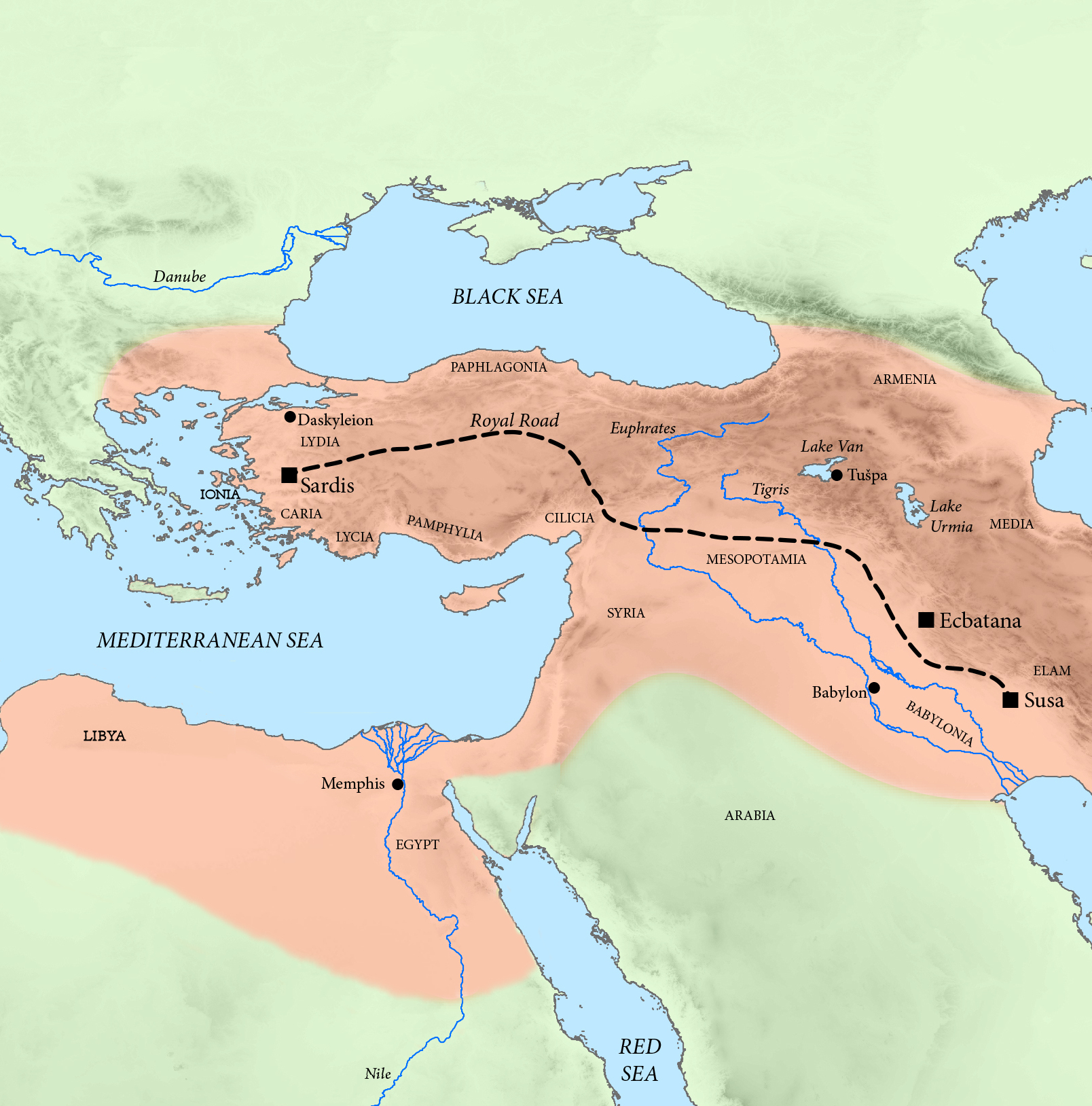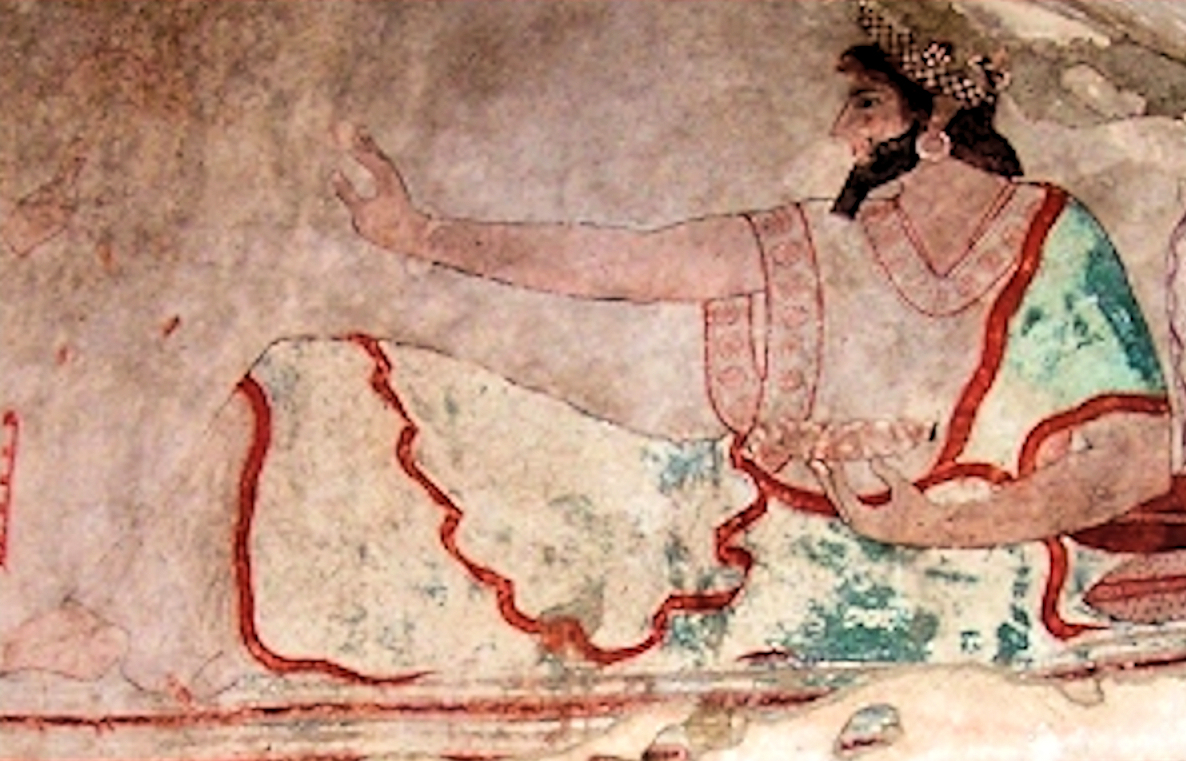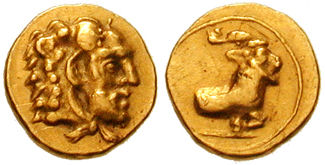|
Tiribazos
Tiribazus, Tiribazos or Teribazus (Old Iranian: ''Tīrībāzu'') (c.440 BC-370 BC) was an Achaemenid satrap of Western Armenia and later satrap of Lydia in western Anatolia. Satrap of Western Armenia He was highly regarded by the Persian King Artaxerxes II, and when he was present, so Xenophon tells us, no one else had the honour of helping the sovereign to mount his horse. Until 395 BC, Tiribazus served as the hyparch of Western Armenia. Satrap of Lydia He succeeded Tithraustes as satrap of Western Asia (Sardis). He was holding this office when, in 393 BC, Antalcidas was sent to negotiate, through him, a peace for Sparta with the Persian king. In 392 BC, while the Corinthian War was being contested amongst the Greek states, Tiribazus received envoys from the major belligerents of that war, and held a conference in which a proposal for ending the war was discussed. That discussion failed, but Tiribazus, convinced that Athens was becoming a threat to Persia in the Aegean, secr ... [...More Info...] [...Related Items...] OR: [Wikipedia] [Google] [Baidu] |
Satrap
A satrap () was a governor of the provinces of the ancient Median and Achaemenid Empires and in several of their successors, such as in the Sasanian Empire and the Hellenistic empires. The satrap served as viceroy to the king, though with considerable autonomy. The word came to suggest tyranny or ostentatious splendour, and in modern usage refers to any subordinate or local ruler, usually with unfavourable connotations of corruption. A satrapy is the territory governed by a satrap. Etymology The word is derived via Latin from Greek ''satrápes'' (), itself borrowed from an Old Iranian ''*khshathra-pa''. In Old Persian, which was the native language of the Achaemenids, it is recorded as ''khshathapavan'' (, literally "protector of the province"). The Median form is reconstructed as ''*khshathrapavan-''. It is cognate with Sanskrit ''kshetrapal'' (). The Biblical Hebrew form is ''aḥashdarpan'' , as found in . In the Parthian (language of the Arsacid Empire) and Middle Persia ... [...More Info...] [...Related Items...] OR: [Wikipedia] [Google] [Baidu] |
Antalcidas
Antalcidas ( grc-gre, Ἀνταλκίδας; died BC), son of Leon, was an ancient Greek soldier, politician, and diplomat from Sparta. __NOTOC__ Life Antalcidas came from a prominent family and was likely a relation by marriage to the Spartan king Agesilaus II. Antalcidas is first recorded at the outset of the Corinthian War. Following the end of the Peloponnesian War after the destruction of the Athenian fleet at the Battle of Aegospotami in 405 BC, Sparta had launched a series of raids against the Persian satrapies of Asia Minor. Pharnabazus, satrap of Hellespontine Phrygia, finally responded by sending the Rhodian Timocrates to bribe the other Greek city states into declaring war on Sparta. Thebes rose up in 395 BC, eventually encouraging others to join in what became known as the Corinthian War. Persia was now on friendly terms with Athens and Pharnabazus permitted their disgraced general Conon to command his fleet of Phoenician and Cypriot ships in a ... [...More Info...] [...Related Items...] OR: [Wikipedia] [Google] [Baidu] |
Satrap
A satrap () was a governor of the provinces of the ancient Median and Achaemenid Empires and in several of their successors, such as in the Sasanian Empire and the Hellenistic empires. The satrap served as viceroy to the king, though with considerable autonomy. The word came to suggest tyranny or ostentatious splendour, and in modern usage refers to any subordinate or local ruler, usually with unfavourable connotations of corruption. A satrapy is the territory governed by a satrap. Etymology The word is derived via Latin from Greek ''satrápes'' (), itself borrowed from an Old Iranian ''*khshathra-pa''. In Old Persian, which was the native language of the Achaemenids, it is recorded as ''khshathapavan'' (, literally "protector of the province"). The Median form is reconstructed as ''*khshathrapavan-''. It is cognate with Sanskrit ''kshetrapal'' (). The Biblical Hebrew form is ''aḥashdarpan'' , as found in . In the Parthian (language of the Arsacid Empire) and Middle Persia ... [...More Info...] [...Related Items...] OR: [Wikipedia] [Google] [Baidu] |
Lydia (satrapy)
The Satrapy of Lydia, known as Sparda in Old Persian (Old Persian cuneiform 𐎿𐎱𐎼𐎭, ''Sparda''), was an administrative province ( satrapy) of the Achaemenid Empire, located in the ancient kingdom of Lydia, with Sardis as its capital. Achaemenid Satrapy Tabalus, appointed by Cyrus the Great, was the first satrap; however, his rule did not last long as the Lydians revolted. The insurrection was suppressed by general Mazares and his successor Harpagus. After Cyrus' death, Oroetus was appointed as satrap. Oroetus ruled during the reign of Cambyses, and after the chaotic period that followed the Persian king's death, he conquered the Greek isle of Samos, killing its ruler Polycrates. Due to his growing power, Darius the Great had Bagaeus kill Oroetus. Bagaeus himself may have become satrap for a short period, but the next rulers were Otanes and Darius' younger brother, Artaphernes. Ionian revolt (499 BCE) During the Ionian revolt in 499 BC, Sardis was sacked by the Greek ... [...More Info...] [...Related Items...] OR: [Wikipedia] [Google] [Baidu] |
Hyparch
A satrap () was a governor of the provinces of the ancient Median and Achaemenid Empires and in several of their successors, such as in the Sasanian Empire and the Hellenistic empires. The satrap served as viceroy to the king, though with considerable autonomy. The word came to suggest tyranny or ostentatious splendour, and in modern usage refers to any subordinate or local ruler, usually with unfavourable connotations of corruption. A satrapy is the territory governed by a satrap. Etymology The word is derived via Latin from Greek ''satrápes'' (), itself borrowed from an Old Iranian ''*khshathra-pa''. In Old Persian, which was the native language of the Achaemenids, it is recorded as ''khshathapavan'' (, literally "protector of the province"). The Median form is reconstructed as ''*khshathrapavan-''. It is cognate with Sanskrit ''kshetrapal'' (). The Biblical Hebrew form is ''aḥashdarpan'' , as found in . In the Parthian (language of the Arsacid Empire) and Middle Persian ... [...More Info...] [...Related Items...] OR: [Wikipedia] [Google] [Baidu] |
Peace Of Antalcidas
The King's Peace (387 BC) was a peace treaty guaranteed by the Persian King Artaxerxes II that ended the Corinthian War in ancient Greece. The treaty is also known as the Peace of Antalcidas, after Antalcidas, the Spartan diplomat who traveled to Susa to negotiate the terms of the treaty with the king of Achaemenid Persia. The treaty was more commonly known in antiquity, however, as the King's Peace, a name that reflects the depth of Persian influence in the treaty, as Persian gold had driven the preceding war. The treaty was a form of Common Peace, similar to the Thirty Years' Peace which ended the First Peloponnesian War. The end of the war By 387 BC, the central front of the Corinthian War had shifted from the Greek mainland to the Aegean, where an Athenian fleet under Thrasybulus had successfully placed a number of cities across the Aegean under Athenian control, and was acting in collaboration with Evagoras, the king of Cyprus. Since Evagoras was an enemy of Persia, an ... [...More Info...] [...Related Items...] OR: [Wikipedia] [Google] [Baidu] |
Corinthian War
The Corinthian War (395–387 BC) was a conflict in ancient Greece which pitted Sparta against a coalition of city-states comprising Thebes, Athens, Corinth and Argos, backed by the Achaemenid Empire. The war was caused by dissatisfaction with Spartan imperialism in the aftermath of the Peloponnesian War (431–404 BC), both from Athens, the defeated side in that conflict, and from Sparta's former allies, Corinth and Thebes, who had not been properly rewarded. Taking advantage of the fact that the Spartan king Agesilaus II was away campaigning in Asia against the Achaemenid Empire, Thebes, Athens, Corinth and Argos forged an alliance in 395 BC with the goal of ending Spartan hegemony over Greece; the allies' war council was located in Corinth, which gave its name to the war. By the end of the conflict, the allies had failed to end Spartan hegemony over Greece, although Sparta was durably weakened by the war. At first, the Spartans achieved several successes in pitched battles ... [...More Info...] [...Related Items...] OR: [Wikipedia] [Google] [Baidu] |
Mallus (Cilicia)
Mallus ( el, η Μαλλός ''Mallos''; ethnonym: Μαλλώτης) was an ancient city of Cilicia Campestris (later Cilicia Prima) lying near the mouth of the Pyramus (river), Pyramus (now the Ceyhan Nehri) river, in Anatolia. In ancient times, the city was situated at the mouth of the Pyramus (which has changed course since), on a hill opposite Magarsa (or Magarsus) which served as its port. The district was called from it, Mallotis. The location of the site is currently inland a few km from the Mediterranean Sea, Mediterranean coast on an elevation in the Karataş Peninsula, Adana Province, Turkey, a few km from the city of Karataş. History Greek legend credited the establishment of Mallus to two Ancient Argos, Argive brothers named Amphilochus and Mopsus. Amphilochus is variously described as the king and seer who was Amphilochus (son of Amphiaraus), the son of Amphiaraus and the brother of Alcmaeon (mythology), Alcmaeon; Amphilochus (son of Alcmaeon), Alcmaeon's son; or, in ... [...More Info...] [...Related Items...] OR: [Wikipedia] [Google] [Baidu] |
Athens
Athens ( ; el, Αθήνα, Athína ; grc, Ἀθῆναι, Athênai (pl.) ) is both the capital and largest city of Greece. With a population close to four million, it is also the seventh largest city in the European Union. Athens dominates and is the capital of the Attica region and is one of the world's oldest cities, with its recorded history spanning over 3,400 years and its earliest human presence beginning somewhere between the 11th and 7th millennia BC. Classical Athens was a powerful city-state. It was a centre for the arts, learning and philosophy, and the home of Plato's Academy and Aristotle's Lyceum. It is widely referred to as the cradle of Western civilization and the birthplace of democracy, largely because of its cultural and political influence on the European continent—particularly Ancient Rome. In modern times, Athens is a large cosmopolitan metropolis and central to economic, financial, industrial, maritime, political and cultural life in Gre ... [...More Info...] [...Related Items...] OR: [Wikipedia] [Google] [Baidu] |
Aegean Sea
The Aegean Sea ; tr, Ege Denizi (Greek language, Greek: Αιγαίο Πέλαγος: "Egéo Pélagos", Turkish language, Turkish: "Ege Denizi" or "Adalar Denizi") is an elongated embayment of the Mediterranean Sea between Europe and Asia. It is located between the Balkans and Anatolia, and covers an area of some 215,000 square kilometres. In the north, the Aegean is connected to the Marmara Sea and the Black Sea by the straits of the Dardanelles and the Bosphorus. The Aegean Islands are located within the sea and some bound it on its southern periphery, including Crete and Rhodes. The sea reaches a maximum depth of 2,639m to the west of Karpathos. The Thracian Sea and the Sea of Crete are main subdivisions of the Aegean Sea. The Aegean Islands can be divided into several island groups, including the Dodecanese, the Cyclades, the Sporades, the Saronic Islands, Saronic islands and the North Aegean islands, North Aegean Islands, as well as Crete and its surrounding islands. The ... [...More Info...] [...Related Items...] OR: [Wikipedia] [Google] [Baidu] |
Sparta
Sparta ( Doric Greek: Σπάρτα, ''Spártā''; Attic Greek: Σπάρτη, ''Spártē'') was a prominent city-state in Laconia, in ancient Greece. In antiquity, the city-state was known as Lacedaemon (, ), while the name Sparta referred to its main settlement on the banks of the Eurotas River in Laconia, in south-eastern Peloponnese. Around 650 BC, it rose to become the dominant military land-power in ancient Greece. Given its military pre-eminence, Sparta was recognized as the leading force of the unified Greek military during the Greco-Persian Wars, in rivalry with the rising naval power of Athens. Sparta was the principal enemy of Athens during the Peloponnesian War (431–404 BC), from which it emerged victorious after the Battle of Aegospotami. The decisive Battle of Leuctra in 371 BC ended the Spartan hegemony, although the city-state maintained its political independence until its forced integration into the Achaean League in 192 BC. The city nevertheless ... [...More Info...] [...Related Items...] OR: [Wikipedia] [Google] [Baidu] |
Evagoras I
Evagoras or Euagoras ( grc, Εὐαγόρας) was the king of Salamis, Cyprus, Salamis (411–374 BC) in Cyprus, known especially from the work of Isocrates, who presents him as a model ruler. History He claimed descent from Teucer, the son of Telamon and half-brother of Ajax the Great, Ajax, and his family had long been rulers of Salamis, although during his childhood Salamis came under Phoenician control, which resulted in his exile. While in Cilicia, Evagoras gathered the support of 50 followers and returned secretly in 410, to gain possession of the throne. Expecting an eventual Achaemenid Empire, Persian response to recapture Cyprus, he cultivated the friendship of the Classical Athens, Athenians, and after Conon's defeat at the Battle of Aegospotami he provided him with a refuge. For a time he also maintained friendly relations with Achaemenid Empire, Persia, and secured the aid of Artaxerxes II for Athens against Sparta. He took part in the Battle of Cnidus of 394 BC which ... [...More Info...] [...Related Items...] OR: [Wikipedia] [Google] [Baidu] |






.jpg)




